- Home
- A. A. Attanasio
Servant of Birds Page 5
Servant of Birds Read online
Page 5
"That was long ago, Thierry."
"My Arrière-grand-mère would remember."
"Yes, she would, and, indeed, she should—" Ailena's face grows even paler, and her eyes look startled. "That was a time of much suffering. We only live in fire. You and your twin sister Madelon were born in the winter of eighty-three, when blizzards kept our Maître Pornic shut away in his abbey. We would have waited for the thaw to baptize the two of you, but a scourge of cholera plagued the village and threatened the castle. We lived indeed in a time of fire. We only live in fire. But we knew it then. Your dear mother, Hellene, burned with it even as you were born. An old priest from Brecon blew in with the storm, and he baptized you both that your souls would be purged of Adam’s sin in the event the plague took you. It did not, but, God rest his soul, it took the priest later that winter. His name was Father Aimery."
Ailena stands, and the assembly rises with her. "We only live in fire, consumed by it or purified. Either way, we burn. Our blood burns. We feel the heat in our flesh. It is our lifelong purification, this fire that is God's love, this intolerable fire that consumes us. This is the death of fire, which is the life of fire."
David Tibbon has come up behind the baroness. He lays a knobby hand on her arm, and she looks at him, surprised.
"This inquisition is tiresome," she says. "Let us reconvene at table." She smiles down at Guy and Roger. "You can sharpen your questions while we dull our appetites."
-/
In the dining hall, the dwarf approaches the Jew. While the baroness and the other nobles refresh themselves in their rooms before the meal, the dwarf has been parading around the long and narrow tables, watching the attendants spread out enormous tablecloths and double the napkins. The monkey has several times darted under the billowing sheets before they could be laid, causing the attendants to leap back and scream.
"Ta-Toh!" the dwarf shouts, and the monkey flies back to his shoulder, wearing a napkin like a mantle.
"Tonight, at last, we will eat well," the dwarf tells the Jew.
David Tibbon, in russet cloak and dark green tunic, sits on a bench beside the entrance, where he has situated himself since the baroness' brief address in the main hall. The entrance, an arched doorway facing south into the court garden, streams with sunlight, bird song, and floral fragrances.
David has read the leatherbound book in his lap and napped here while the servitors prepared a chamber for him in the palais. Particularly in the sunlight, he appears noticeably like a patriarch of the Bible, with deeply creased skin and intensely somber eyes. His long gray beard is forked, the dangling locks at his temples loosely braided, and upon his head he wears a small cap of black velvet.
"I will not eat well, Ummu," he answers the dwarf in slow, thoughtful langue d'oc, "until I have found a place to eat where there is only one God."
Ummu leans his elbow on David's knee and rests his bulbous head on his hand to gaze up at the sculptures of saints in the stonework between the tapered windows. "Idolators," the dwarf concurs. "Yet, they think not. No contradiction to them that there is one God with three parts. They've a mind for contradictions that baffles their enemies. Don't let it disturb your appetite, son of Abraham. For that, there'll be plenty of steaming pork dishes wafting under your nose!"
The dwarf barks a laugh that startles his monkey, and the two prance across the dining hall to trouble the steward, who is now laying out the drinking vessels, the knives, and spoons.
David shakes his old head remorsefully and turns his stare on the garden. His eyes hurt from reading, and he is glad to stretch his sight among bouncing butterflies and amber streaks of bees.
Under a rose arbor, silhouetted against the broad, golden rays of the afternoon sun, several children watch him. He wags his beard at them playfully and they scatter, except for one, who approaches with trepidation. She is the youngest, a tow-haired child with gray, wondering eyes, dressed in a little robe of taffeta and fur.
"Are you a Jew?" she asks.
"Yes. I am David Tibbon. And who are you?"
"Blythe Almquist. I'm a Christian. Why did you kill Jesus?"
David puts his hand on the young child's head and smiles sadly. "I did not kill Jesus."
"Yes you did. The Jews killed Jesus. Maître Pornic has told us so."
"That is not true, child. Jesus was a Jew. Why would we kill one of our own? It was the Romans who killed Jesus."
"Jesus was a Jew?"
"Yes, of course."
"But Maître Pornic tells us that Jesus is the son of God."
"Then the son of God is a Jew."
The nurse, looking flustered, enters from the garden and, seeing Blythe standing under David's arm, anxiously pulls the girl away. "Come, Blythe, we must dress for dinner."
"I'm talking with David Tibbon. He's a Jew—and he says Jesus is also a Jew!"
The nurse gives David a black look and hurries the child away.
David pinches the tired flesh between his eyes and turns his attention to the dwarf, who has armed his monkey with a spoon and duels with it atop one of the tables.
The steward drives them off. He is setting little dishes filled with salt at the center of the tables.
David stares at the white mounds and remembers the years when the only salt he knew came from his eyes.
-/
Guy and Roger huddle with their sergeants at the gate of the inner ward. One of the men startles and points up at the donjon. Atop the great keep, the Griffin banner descends.
"God's eyes!" Guy shouts. He leaps atop the nearest steed and rides at full gallop across the court.
By the time he reaches the donjon, the white Swan on the blue field flies. He drops from his horse and seizes the sergeant at the entrance of the donjon. "Why are you alive?" he yells at the quaking man and throws him against the stone wall.
"I moved to draw my weapon, lord," the sergeant yammers, "but the Muslim, the Swedish Muslim, cut my baldric clean off before my hand could reach the hilt!" He shows his liege the severed leather strap.
"And the others?" Guy asks furiously.
"The others were moved by reason," a foreign-spiced voice says from the dark of the entrance. Gianni Rieti emerges. "I am the pope's emissary. I have the power to damn souls. How reasonable of your men that none wished to die by a Muslim sword in a state of fallen grace."
-/
Since Ailena's departure for the Holy Land, Clare has occupied the baroness' spacious bedroom. Now, she insists on returning it to her mother. Among the canvas-wrapped satchels of Ailena's baggage, the young children frolic, fresh from playing in the garden, their long tresses bright with blossoms they wear like chaplets.
Ailena sits in a window chair, mantled in sunlight, admiring the females of her family. The youngest, three-year-old Effie, playing with her hair ribbons, lies content in her great-grandmother's lap.
Daughter Clare happily oversees the servitors unwrapping the baggage. Granddaughters Hellene and Leora and great-granddaughter Madelon perch on the edge of the platform, where the great canopied bed is being aired, curtains drawn, sheets stripped.
Dwn watches from a stool beside Ailena, feeling drunk in the heady bouquet of lilac and the silky caress of her fine garments.
"Be still, girls," Ailena urges. "I have gifts from the Holy Land for everyone. But you must receive them as young ladies."
The playing comes to an abrupt halt, and the girls array themselves before the baroness in order of age. "Joyce, Gilberta, Blythe, and Effie," Ailena repeats the names she has learned, touching each affectionately on the chin. "You are the youngest, born after I departed this castle, so your gifts are first."
At her side, propped on a bench draped with the canvas that had covered it, lies a casket inlaid with black silver and rainbow-hued abalone. From it, she removes four small, precisely carved beasts: a dromedary, crocodile, elephant, and lion. "These strange and remarkable creatures, which do exist—I have seen them all—were carved by Saracens out of ivory, the tus
k of the behemoth."
The girls, young Effie included, finger the magical figurines with reverent amazement.
"Madelon, in my absence you have become a beautiful woman." Ailena beckons her forward and presents her with a kirtle of silver fabric as shimmery as moonlight. "Damascene silk, the finest in all of Byzantium."
While Madelon stands enraptured before the mirror with the elegant gown held against her narrow body, Ailena distributes the other gifts: perfumes—oil of myrcia and bergamot—for Hellene and Leora; vials of jasmine water and balm of Gilead for Dwn and the most valued servants; incense cakes of calambac and lignaloes for the chapel and the abbey; intricately tooled cinctures of blue leather for the boys, Thierry and Hugues; Arabian bridle tassels in bold colors for the knights; a curved Mamluk dagger with a pearl handle and gem-studded sheath she will give to Guy; and, for Clare, a gold necklace.
The women cluster together, admiring their gifts, and Ailena sits back, pleased by their giddy wonder. A movement outside the window catches her eye, and she turns her head to watch Guy galloping full-out across the courtyard.
A soft smile touches her lips.
-/
Guy has rallied his knights in a back room of the barracks. Sprawled upon the crude settles of the empty room, Roger, William, and Harold, looking nervous and morose, wait for him to begin.
Denis is the last to enter, summoned by a page from archery practice behind the stables. Leather still straps his right hand. After nodding to the others, he straddles a bench facing Guy, who stands with his back to the room, staring out a square window. The baron’s gaze has locked on the donjon, where the Swan ensign of his mother streams.
If all these years I've been wrong about God – if He is more than an invention of people's despair, he thinks, if Creation is as perverse as the Church fathers say and this young thing is truly Mother restored by a miracle, then God is no better than the Devil, for Mother slew Father as sure as Clytemnestra slew Agamemnon. I will not submit to her!
His clenched fists ache with determination. I will send her back to the Devil! And if she is an impostor—as she must be, for where is God when martyrs are slain and pilgrims perish?—if she is an impostor sent by Mother to unseat me, then I will acquaint her with the Devil!
When he turns to face his knights, the single, deep crease across his brow cuts black.
"The Griffin is struck," he says, and his voice sounds oddly soft and woebegone. "The bitch has been here only hours, and already our banner is struck."
"We should have slaughtered them in the lists, as I said," Rogers voice growls. His scarred gray head shakes with remorse. "We should never have let them in."
"They are in," Guy snaps, "and they've made our castle their own. Our holy man, Maître Pornic, is already displaced by that oily-tongued canon. The servitors bustle in the palais preparing rooms for a Muslim and a Jew! And even the cookhouse is afluster, hurrying ahead our Saint John's feast to honor the bitch."
"Your mother is no dog," Denis speaks up timorously.
"Indeed, is she my mother?"
"We've all watched her closely," Denis counters. "She bears all the striking traits. Even her gait and voice are as we remember. And she's answered all the queries put to her. Most telling of all, she has acted with the asseveration and privilege that were always her custom. Only your mother would dare strike the Griffin." Denis looks anxiously at the others. "Does anyone here say otherwise? Has anyone here detected in her any feature other than the very semblance of the baroness?"
"The baroness left here aged and crippled," Roger says. "I aver, this is not the same woman."
"Your faithlessness blinds you," Denis retorts.
"She speaks like a mad woman," Roger says. "You heard her in the great hall, ranting about fire. She is a mad woman who thinks she is the baroness."
"Who would not rant if a miracle had been worked upon them?" Denis asks. "She has been made new by her faith. We must answer her in kind."
"Faith!" Guy cries. "Am I to lose all that is mine for ... for a mere word? Faith! Men—my faith has ever been in my sword. By that we have won lands my mother was too docile to claim. Will we now lose all we have fought for because of faith? This woman is an impostor. I have faith in that."
"What say you, William ... Harold?" Denis asks. "You have heard her speak. You have watched her move. Is she not the baroness?"
Harold runs a hand over his bald and freckled cope and nods. "This is truly the most marvelous change I have ever witnessed. God's hand alone could do this. It is a miracle. How else could it be?"
William shrugs and makes provisional noises.
"Speak, William," Denis insists. "Do you recognize her?"
"I am not accustomed to miracles," William answers hesitantly. "I have seen no miracles before nor have I ever expected to."
"Is she the baroness?" Denis presses.
William tugs at his great mustache. "I must think on it, Denis. She is among us too short a time."
"What of Neufmarche?" Roger demands. "Our miners have nearly sundered his curtain wall. The men we have hired from Hereford are waiting upon our return to complete this siege. We must go back at once."
"Yes," Guy asserts. "Neufmarche is ready to be shucked like an oyster. We will take his castle for our own, and the Griffin will fly again within the day."
"William," Roger asks, "are you with us?"
William nods and looks to Harold.
"It is right and just that we finish what we have begun," Harold replies.
Denis meets the expectant gazes of the other knights, then faces Guy with a hard stare. "Guy, our obedience belongs to your mother now. We must present the siege to her."
Guy’s mouth gapes in a silent, incredulous laugh. "Denis, Mother was Neufmarche-pere's bed-warmer. She'll not bless our sacking his son's castle."
"Then, we'll pay off the Hereford men and send them back."
"Pay them off?" Roger erupts. "With what? Shall we sack our own castle?"
"The baroness should be apprised."
"Oh, I'm sure she is being well apprised by sister Clare," Guy says glumly and sits down on the bench beside Denis. His harsh countenance softens. "We have faced off many a foe and brazened many a harrowing time together, you and I. Don't turn from me now, Denis."
Denis engages Guy's imploring stare with stricken sincerity. "I will never turn from you, Guy. Not even death will turn me aside—so long as you do not turn from what is right."
"Is it the king you fear? That did not take you from my side when we joined Count John's men. We harried the squires of Gloucester as comrades."
"Yes, I have defied the king with you. But—" Denis looks away. "It is not in me to defy God."
Guy grimaces. "God is on high. Need I remind you, He did not stoop to spare your family when the scarlet death left you an orphan. Yet, my father took you in, found you a good gentry family and spared you a villein's fate. God cares little enough for the pilgrims who die by the score on their way to the Holy Land. And so, are we to believe God has worked a miracle for my mother, who never breathed a heartfelt prayer her adult life?"
"Shall I deny my own eyes? God, for whatever divine reason, has worked a miracle."
Guy passes a befuddled look to Roger, who glares back with annoyance. "I will expose this impostor," Guy swears and seizes Denis by the shoulders. "I must. For I will not lose you, Denis."
-/
A trumpet clarion summons the household to the welcoming feast. Clare and Gerald act as hosts and first lead Maître Pornic to the lavatory before the entrance, a table set with water basins and jugs.
Deeply offended that he has been replaced as the castle's chief ecclesiastic by an unknown canon, Maître Pornic had intended to return to his abbey that night. Clare prevailed on him to stay. And now, with true Christian humility, he makes ready to wash his hands for supper though he wears a bitter expression.
Two well-groomed varlets bow to the priest: One holds a jug over a small basin and dexterously p
ours water over the holy man's fingers. Immediately, the second varlet wipes them dry with a towel. After the cleric's hands are cleaned, Ailena and Dwn have their hands washed and then are led to the seats of honor under the canopy at the high table.
The guests follow and varlets seat them at the tables: Canon Rieti, Falan, Guy, and Roger, the knights and their families, and the castle's wealthiest merchants and guildsmen. Then, the castle's chief servitors and sergeants enter and seat themselves at the boards that have been set on sawhorses at the back of the hall.
The dwarf and the Jew, situated in a distant corner, arrive last. After everyone is placed, Canon Rieti says grace, whereupon servants carry in the great dishes.
A haunch of stag appears first, and while Gerald carves and the young girls of the nobility serve one plate to be shared by two, Ailena leans over to Clare. "I wish David Tibbon to be seated here at the high table."
"Mother—the man's a Jew! Leora says he's been filling Blythe's ears with nonsense—claiming Jesus for the Jews and such!"
Ailena's stare holds, level and cold. "Bring David to the high table."
Clare's mouth hangs open. "Mother, no one will share a plate with him."
"David will share my plate."
Clare does not hide her hurt as she beckons a servitor and whispers the baroness' command. She had intended to share her mother's plate and now displaces the old woman Dwn's place with Gerald.
Canon Rieti recognizes the problem, and he signals for his dwarf to join him. They will share a plate, and Dwn may take the Canon's place with Falan Askersund. As the Jew and the dwarf ascend to the high table, a hush falls over the hall and scandalized murmurs buzz among the diners.
A boar's head glazed in herb sauce arrives, followed by a stuffed swan replete with outspread wings and shyly bowed neck, and diverts the assembly's interest.

 The Conjure Book
The Conjure Book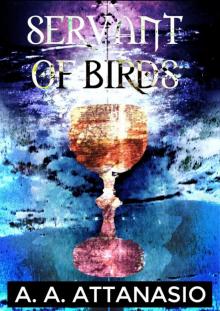 Servant of Birds
Servant of Birds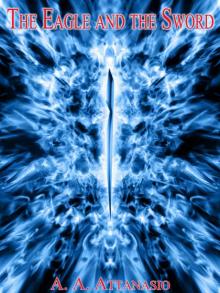 The Eagle and the Sword (The Perilous Order of Camelot Book 2)
The Eagle and the Sword (The Perilous Order of Camelot Book 2)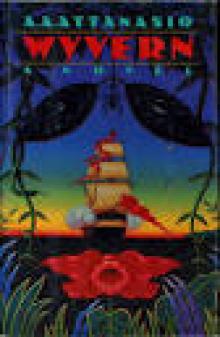 Wyvern
Wyvern The Last Legends of Earth
The Last Legends of Earth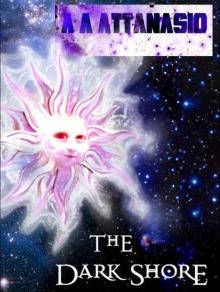 The Dark Shore (The Dominions of Irth Book 1)
The Dark Shore (The Dominions of Irth Book 1)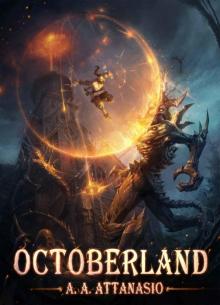 Octoberland (The Dominions of Irth Book 3)
Octoberland (The Dominions of Irth Book 3)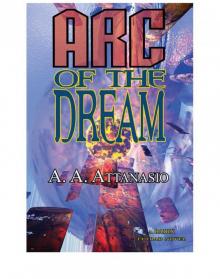 Arc of the Dream
Arc of the Dream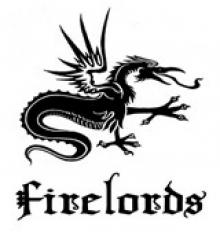 p1b6fn7sdh1ln0g4v1pkvkuqim54
p1b6fn7sdh1ln0g4v1pkvkuqim54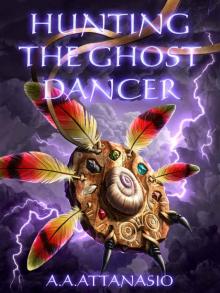 Hunting the Ghost Dancer
Hunting the Ghost Dancer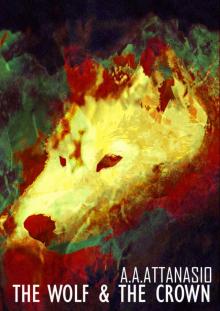 The Wolf and the Crown (The Perilous Order of Camelot Book 3)
The Wolf and the Crown (The Perilous Order of Camelot Book 3)